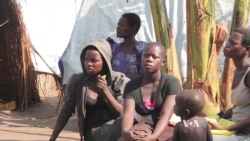More than 1,000 people living in a makeshift camp called Rwamutonga, in the Hoima district in western Uganda, say they have been kicked off their land without any warning because it has been earmarked for oil exploration.
The residents woke up early one morning last August to the sounds of chaos and gunfire.
The attackers "went ahead with guns and then burning houses, stealing our goats," said camp leader Alex Latim. "And they were looting, burning houses, and we were running away.”
According to police, 10 new land disputes are reported daily. The claims come amid an oil boom as investors appear to be cashing in by selling parcels of land to multiple buyers.
But Rwamutonga's case is slightly different, according to local government official Ambrose Mwesigye. He said there are clear laws and regulating land ownership in Uganda and that the people of Rwamutonga do not have any proof that they either inherited or bought the land or were hosted by the owner.
In his reading of the events, the people are used as proxies in a land dispute between what is to him the rightful owner and someone who is “encroaching on the land.”
However, Rwamutonga resident Hellen Ayesiga disagreed. She said the government is not protecting them as it should.
“We normally vote for the governing party, but they don’t recognize us as Ugandans," she said. "We are here suffering. So my appeal is that government should come and assist, because soon they will rush for votes."
NAPE is a local grassroots community organization helping people in the oil rich region of Hoima against exploitation. A few times a week, they host a local community radio show offering a platform to victims of land disputes and informing the people about their rights. According to NAPE field officer and radio host Vicent Nyegenya, the story of Rwamutonga is not exceptional.
“Major complaints are about land grabbing," he said. "Once they learned that there’s oil here, people from different parts of the country, from different parts of the world, have come here to Bunyoro [Kingdom] to grab our land. They have been buying it cheaply. Others have been conniving with other government officials to grab people’s land.”
A court judgment that will determine whether the people of Rwamutonga can go back to what they call their homeland is set for March 23. One thing is sure: If the court rules against them, they will have to pack their belongings again and find a new home.





